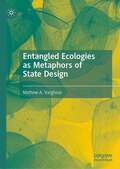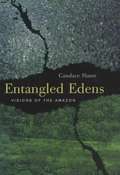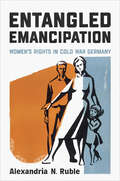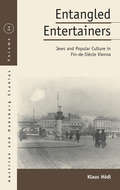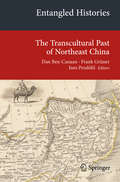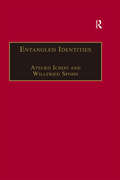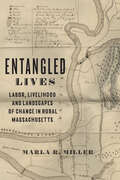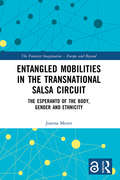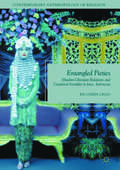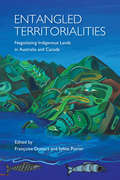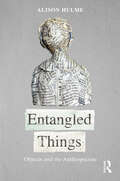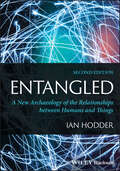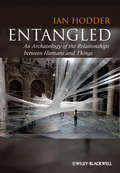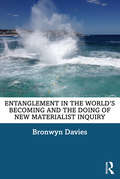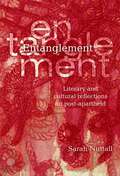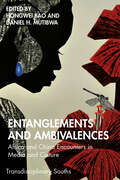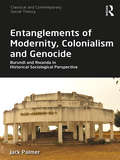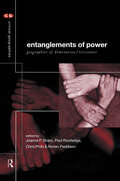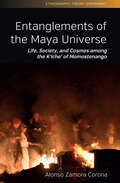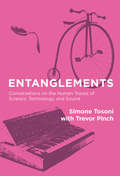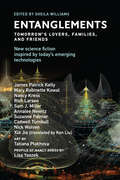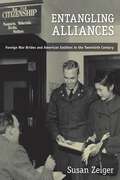- Table View
- List View
Entangled Ecologies as Metaphors of State Design
by Mathew A. VargheseThis book takes a unique approach to the ethnographic and analytical explorations of ecologies in the making. The core theme of the work will be the emerging anthropocene contexts that simultaneously bring unprecedented human interactions with the non-human as well as the emergence of hybrid ecologies. There will be dependence on existing literature, own ethnographic work that has already went into this, the closer introspection of immediate geographies as well as the pertinent debates. There has been a reconfiguration of meaning and nature of spaces in the context of social relations produced by neo-liberal globalization. States as they have been are transforming and are influenced by policies made beyond borders. This work is marked out by careful enquiry on ecologies in the making with the backdrop of distinct regional developmentalist trajectories as well as specific ethnography from Kerala, South-West India.
Entangled Edens: Visions of the Amazon
by Candace SlaterStories and writings about the Amazon, by insiders (Indians, miners) and outsiders (explorers, scientists). Slater argues that these tales, examined together, show us an Amazon much more complex than "Save the Rain Forest" slogans--a vision that will allow us to save the Amazon in all its human and biological diversity.
Entangled Emancipation: Women’s Rights in Cold War Germany (German and European Studies #52)
by Alexandria RubleIn 1900, German legislators passed the Civil Code, a controversial law that designated women as second-class citizens with regard to marriage, parental rights, and marital property. Despite the upheavals in early twentieth-century Germany – the fall of the German Empire after the First World War, the tumultuous Weimar Republic, and the destructive Third Reich – the Civil Code remained the law of the land. After Nazi Germany’s defeat in 1945 and the founding of East and West Germany, legislators in both states finally replaced the old law with new versions that expanded women’s rights in marriage and the family. Entangled Emancipation reveals how the complex relationship between the divided Germanys in the early Cold War catalysed but sometimes blocked efforts to reshape legal understandings of gender and the family after decades of inequality. Using methods drawn from gender history and discourse analysis, the book restores the history of the women’s movements in East and West Germany. Entangled Emancipation ultimately explores the parallel processes through which East and West Germany reimagined, negotiated, and created new civil laws governing women’s rights after the Second World War.
Entangled Entertainers: Jews and Popular Culture in Fin-de-Siècle Vienna (Austrian and Habsburg Studies #24)
by Klaus HödlViennese popular culture at the turn of the twentieth century was the product of the city’s Jewish and non-Jewish residents alike. While these two communities interacted in a variety of ways to their mutual benefit, Jewish culture was also inevitably shaped by the city’s persistent bouts of antisemitism. This fascinating study explores how Jewish artists, performers, and impresarios reacted to prejudice, showing how they articulated identity through performative engagement rather than anchoring it in origin and descent. In this way, they attempted to transcend a racialized identity even as they indelibly inscribed their Jewish existence into the cultural history of the era.
Entangled Histories
by Dan Ben-Canaan Frank Grüner Ines ProdöhlThe authors of this book focus on transcultural entanglements in Manchuria during the first half of the twentieth century. Manchuria, as Western historiography commonly designates the three northeastern provinces of China, was a politically, culturally and economically contested region. In the late nineteenth century, the region became the centre of competing Russian, Chinese and Japanese interests, thereby also attracting global attention. The coexistence of people with different nationalities, ethnicities and cultures in Manchuria was rarely if ever harmoniously balanced or static. On the contrary, interactions were both dynamic and complex. Semi-colonial experiences affected the people's living conditions, status and power relations. The transcultural negotiations between all population groups across borders of all kinds are the subject of this book. The chapters of this volume shed light on various entangled histories in areas such as administration, the economy, ideas, ideologies, culture, media and daily life.
Entangled Histories in Palestine/Israel: Historical and Anthropological Perspectives (Routledge Studies in Middle Eastern History)
by Ursula WokoeckThis edited volume offers a new critical approach to the study of Zionist history and Israeli-Palestinian relations, based on the encounter between history and anthropology.Informed by the anthropological method of setting large questions to intimate settings, the book examines processes of Zionist colonization, nation-building and Palestinian dispossession by focusing on encounters between members of different national, religious and ethnic groups “from below”—through paying close attention to life stories and reconstructing everyday practices and micro-histories of places and communities. Thus, it tells a complex story in which the practices of historical actors are not simply reducible to a single underlying logic of colonization, even as they participate in the production and reproduction of colonial structures. This approach effectively undermines the prevailing tendency to study national communities in isolation, projecting onto the past an essentialist and rigid separation. Rather than assuming two clearly bounded and monolithic national groups, caught from the start in perpetual conflict, this volume probes their historical production through their evolving relationships, and their varied and shifting political, social, economic and cultural manifestations. The book will be of interest to students and researchers in an array of fields, including the history of Israeli-Palestinian relations, anthropological perspectives on settler colonialism, and Zionism.
Entangled Identities: Nations and Europe
by Willfried SpohnProviding a comprehensive and comparative analysis of the way national and European identities are intertwined in old and new member states of the European Union, this volume assembles nine country case studies. Each country has experienced different processes of state formation, nation-building and democratization, thus they have each developed different forms of national identity and different patterns of interaction between national and European identities. The case studies illuminate the similarities and differences in how national and European identities have evolved among the nine countries. Rich in empirical data, the volume examines the historical entanglement of national and European collective identities and is therefore well suited for courses on European studies including European integration and enlargement, international relations and sociology.
Entangled Lives: Labor, Livelihood, and Landscapes of Change in Rural Massachusetts (Studies in Early American Economy and Society from the Library Company of Philadelphia)
by Marla MillerAn enlightening look at American women's work in the late eighteenth century.What was women's work truly like in late eighteenth-century America, and what does it tell us about the gendered social relations of labor in the early republic? In Entangled Lives, Marla R. Miller examines the lives of Anglo-, African, and Native American women in one rural New England community—Hadley, Massachusetts—during the town's slow transformation following the Revolutionary War. Peering into the homes, taverns, and farmyards of Hadley, Miller offers readers an intimate history of the working lives of these women and their vital role in the local economy. Miller, a longtime resident of Hadley, follows a handful of eighteenth-century women working in a variety of occupations: domestic service, cloth making, health and healing, and hospitality. She asks about the social openings and opportunities this work created—and the limitations it placed on ordinary lives. Her compelling stories about women's everyday work, grounded in the material culture, built environment, and landscapes of rural western Massachusetts, reveal the larger economic networks in which Hadley operated and the subtle shifts that accompanied the emergence of the middle class in that rural community. Ultimately, this book shows how work differentiated not only men and woman but also race and class as Miller follows young, mostly white women working in domestic service, African American women negotiating labor in enslavement and freedom, and women of the rural gentry acting as both producers and employers. Engagingly written and featuring fascinating characters, the book deftly takes us inside a society and shows us how it functions. Offering an intervention into larger conversations about local history, microhistory, and historical scholarship, Entangled Lives is a revealing journey through early America.
Entangled Mobilities in the Transnational Salsa Circuit: The Esperanto of the Body, Gender and Ethnicity (The Feminist Imagination - Europe and Beyond)
by Joanna MenetWith attention to the transnational dance world of salsa, this book explores the circulation of people, imaginaries, dance movements, conventions and affects from a transnational perspective. Through interviews and ethnographic, multi-sited research in several European cities and Havana, the author draws on the notion of "entangled mobilities" to show how the intimate gendered and ethnicised moves on the dance floor relate to the cross-border mobility of salsa dance professionals and their students. A combination of research on migration and mobility with studies of music and dance, Entangled Mobilities in the Transnational Salsa Circuit contributes to the fields of transnationalism, mobility and dance studies, thus providing a deeper theoretical and empirical understanding of gendered and racialised transnational phenomena. As such it will appeal to scholars across the social sciences with interests in migration, cultural studies and gender studies.
Entangled Pieties
by En-Chieh ChaoThis book explores the social life of Muslim women and Christian minorities amid Islamic and Christian movements in urban Java, Indonesia. Drawing on anthropological perspectives and 14 months of participant observation between 2009 and 2013 in the multi-religious Javanese city of Salatiga, this ethnography examines the interrelations between Islamic piety, Christian identity, and gendered sociability in a time of multiple religious revivals. The novel encounters between multiple forms of piety and customary sociality among "moderate" Muslims, puritan Salafists, born-again Pentecostals, Protestants, and Catholics require citizens to renegotiate various social interactions. En-Chieh Chao argues that piety has become a complex phenomenon entangled with gendered sociality and religious others, rather than a preordained outcome stemming from a closed religious tradition.
Entangled Territorialities: Negotiating Indigenous Lands in Australia and Canada
by Francoise Dussart Sylvie PoirierEntangled Territorialities offers vivid ethnographic examples of how Indigenous lands in Australia and Canada are tangled with governments, industries, and mainstream society. Most of the entangled lands to which Indigenous peoples are connected have been physically transformed and their ecological balance destroyed. Each chapter in this volume refers to specific circumstances in which Indigenous peoples have become intertwined with non-Aboriginal institutions and projects including the construction of hydroelectric dams and open mining pits. Long after the agents of resource extraction have abandoned these lands to their fate, Indigenous peoples will continue to claim ancestral ties and responsibilities that cannot be understood by agents of capitalism. The editors and contributors to this volume develop an anthropology of entanglement to further examine the larger debates about the vexed relationships between settlers and indigenous peoples over the meaning, knowledge, and management of traditionally-owned lands.
Entangled Things: Objects and the Anthropocene
by Alison HulmeEntangled Things takes the concept of entanglement as its starting point in investigating the relationship between us and the material things we engage with. Each chapter illustrates a particular form of entanglement – desiring things, hoarding things, creating things, ridding ourselves of things – using ethnographic examples and theoretical perspectives. Hulme encourages a wider consideration of the place of humans in the world, and the kind of choices we enact when influenced by the material things around us. She explores our relationships with material objects in light of both personal and planetary ‘space’, and personal and historical time, from the space in our homes, storage spaces, landfill and oceans; to the times in our lives and the times in wider shared histories that things connect us to, not to mention our sense of time and our own place in the world. In so doing, Hulme intentionally places discussions on our entanglement with things squarely back into the context of the Anthropocene, with a provocative analysis in which the Anthropocene is posited as a concept which on one hand takes away human agency, placing us in the context of immense geological epochs, whilst on the other hand pushes agency upon humans, blaming us for the extreme challenges of the current era and looking to us to solve those challenges. For Hulme, material things are instrumental in helping us to grasp our existential place in the world and weave a way through the complications of living in epochal times.
Entangled: A New Archaeology of the Relationships between Humans and Things
by Ian HodderOffers a comprehensive and accessible introduction to the theory of material entanglement and entrapment, enriched with vivid examples from everyday life Entangled explores how archaeological evidence can help provide a better understanding of the direction of human social and technological change, demonstrating how the interrelationship of humans and things is a defining characteristic of human history and culture. Using examples drawn from both the early farming settlements of the Middle East and daily life in the modern world, Ian Hodder highlights the complex co-dependencies of humans and things—arguing that the maintenance and sustaining of material worlds are the unseen drivers of human development. Updated and expanded, Entangled offers new perspectives on the study of the relationality between things and humans. In this edition, the author reframes relationality in terms of various forms of dependence to better explore inequality, injustice, and the ways people get entrapped in detrimental social and economic situations. An entirely new chapter focuses on human dependence on other humans, such as between colonial powers and colonized people. Increased focus is placed on object-oriented ontologies and assemblages, symmetrical archaeology, and indigenous and radical approaches in archaeology that critique relationality and posthumanism. A wide range of new examples, references, and literature are presented throughout the book. Argues that dependence on things forces humans down particular evolutionary pathways and social trends Demonstrates how long-standing entanglements can be irreversible and increase in scale and complexity over time Integrates archaeology, natural and biological sciences, and the social sciences Presents a critical review of key contemporary perspectives, including material culture studies, phenomenology, evolutionary theory, cognitive archaeology, human ecology, and complexity theory Entangled: A New Archaeology of the Relationships between Humans and Things, Second Edition is essential reading for undergraduate and graduate students, lecturers, researchers, and scholars in the fields of archeology, anthropology, material culture studies, and related fields across the social sciences and humanities.
Entangled: An Archaeology of the Relationships between Humans and Things
by Ian HodderA powerful and innovative argument that explores the complexity of the human relationship with material things, demonstrating how humans and societies are entrapped into the maintenance and sustaining of material worlds Argues that the interrelationship of humans and things is a defining characteristic of human history and culture Offers a nuanced argument that values the physical processes of things without succumbing to materialism Discusses historical and modern examples, using evolutionary theory to show how long-standing entanglements are irreversible and increase in scale and complexity over time Integrates aspects of a diverse array of contemporary theories in archaeology and related natural and biological sciences Provides a critical review of many of the key contemporary perspectives from materiality, material culture studies and phenomenology to evolutionary theory, behavioral archaeology, cognitive archaeology, human behavioral ecology, Actor Network Theory and complexity theory
Entanglement in the World’s Becoming and the Doing of New Materialist Inquiry
by Bronwyn DaviesEntanglement in the World’s Becoming and the Doing of New Materialist Inquiry explores new materialist concepts and the ways in which they provoke an opening up of thought about being human, and about being more-than-human. The more-than-human refers, here, to the world that we are of – a world that includes humans, who are emergent and permeable, and all of the animal and earth others they intra-act with. It explores how we affect those others and are affected. This book engages intimately in encounters of various kinds, some drawn from the author’s everyday life, some from the research projects she has engaged in over several decades, and some from others’ research. It works at the interface of living- and writing-as-inquiry, delving into the rich seam of conceptual possibilities opened up by Deleuze and Guattari, and Barad, and by new materialist inquiry more broadly. It brings not just words to the task, but also art, photopraphs, movement, memories, bodies, sound, touch, things. It delves into the ways in which the entangled dynamics of social, material and semiotic flows and forces make up the diffractive movements through which life emerges, assembles itself, and endures. New materialist concepts, as they are explored here, offer new and emergent approaches to life itself, and to ways in which we might research our lives as they are intricately enfolded in the life of the earth.
Entanglement: Literary and cultural reflections on post-apartheid
by Sarah NuttallThis original book is a much needed and far reaching exploration of post-apartheid South African life worlds. Entanglement aims to capture the contradictory mixture of innovation and inertia, of loss, violence and xenophobia as well as experimentation and desegregation, which characterises the present. The author explores the concept of entanglement in relation to readings of literature, new media forms and painting. In the process, she moves away from a persistent apartheid optic, drawing on ideas of sameness and difference, and their limits, in order to elicit ways of living and imagining that are just starting to take shape and for which we might not yet have a name. In the background of her investigations lies a preoccupation with a future-oriented politics, one that builds on largely unexplored terrains of mutuality while being attentive to a historical experience of confrontation and injury.
Entanglement: The Secret Lives of Hair
by Emma TarloWhen it's not attached to your head, your very own hair takes on a disconcerting quality. Suddenly, it is strange. And yet hair finds its way into all manner of unexpected places, far from our heads, including cosmetics, clothes, ropes, personal and public collections, and even food. Whether treated as waste or as gift, relic, sacred offering or commodity in a billion-dollar industry for wigs and hair extensions, hair has many stories to tell.Collected from Hindu temples and Buddhist nunneries and salvaged by the strand from waste heaps and the combs of long-haired women, hair flows into the industry from many sources. Entering this strange world, Emma Tarlo travels the globe, tracking its movement across India, Myanmar, China, Africa, the United States, Britain and Europe, where she meets people whose livelihoods depend on hair. Viewed from inside Chinese wig factories, Hindu temples and the villages of Myanmar, or from Afro hair fairs, Jewish wig parlours, fashion salons and hair loss clinics in Britain and the United States, hair is oddly revealing of the lives of all it touches.
Entanglements and Ambivalences: Africa and China Encounters in Media and Culture (Transdisciplinary Souths)
by Hongwei Bao and Daniel H. MutibwaThis book explores the media and cultural exchanges between Africa and China in the twenty-first century against the backdrop of the rise of Africa and China in global geopolitics. It situates these cultural encounters in historical and contemporary contexts and through the critical lens of the Global South. It identifies a rising Global South consciousness, despite lingering historical entanglements and emotional ambivalences that continue to characterise Africa-China relations.Bringing together scholars from various disciplines and from different parts of the world, this book examines a wide range of cultural expressions such as arts, literature, translated works, traditional and digital media artefacts and services, and film festivals. It also interrogates emerging cultural interactions, experiences and practices engendered by the increasingly digitalised information and communication technology infrastructure underpinning Africa-China connections and links. In doing so, the book contributes to a more nuanced understanding of Africa-China relations today and the concept of the Global South.
Entanglements of Modernity, Colonialism and Genocide: Burundi and Rwanda in Historical-Sociological Perspective (Classical and Contemporary Social Theory)
by Jack PalmerThis book offers a novel sociological examination of the historical trajectories of Burundi and Rwanda. It challenges both the Eurocentric assumptions which have underpinned many sociological theorisations of modernity, and the notion that the processes of modernisation move gradually, if precariously, towards more peaceable forms of cohabitation within and between societies. Addressing these themes at critical historical junctures – precolonial, colonial and postcolonial – the book argues that the recent experiences of extremely violent social conflict in Burundi and Rwanda cannot be seen as an ‘object apart’ from the concerns of sociologists, as it is commonly presented. Instead, these experiences are situated within a specific route to and through modernity, one ‘entangled’ with Western modernity. A contribution to an emerging global historical sociology, Entanglements of Modernity, Colonialism and Genocide will appeal to scholars of sociology and social theory with interests in postcolonialism, historical sociology, multiple modernities and genocide.
Entanglements of Power: Geographies of Domination/Resistance (Critical Geographies)
by Ronan Paddison Joanne Sharp Paul Routledge Chris PhiloThis book argues that practices of resistance cannot be separated from practices of domination, and that they are always entangled in some configuration. They are inextricably linked, such that one always bears at least a trace of the other that contaminates or subverts it.The team of contributors explore themes of identity, embodiment, organisation, colonialism, and political transformation, examining them from historical, contemporary and more abstract perspectives within a wide geographical and cultural spectrum. Case studies include German Reunification; Jamaican Yardies on British Television; Victorian Sexuality and Moralisation in Cremorne Gardens; Ethnicity, Gender and Nation in Ecuador; Sport as Power; the film Falling Down.Entanglements of Power presents an exciting and challenging account of the symbiotic relationship between domination and resistance, and contextualises this within the parameters of geography with a rich body of case-study material and a respected team of contributors.
Entanglements of the Maya Universe: Life, Society, and Cosmos among the K'iche' of Momostenango (Ethnography, Theory, Experiment)
by Alonso Rodrigo Zamora CoronaCosmology or cosmological ideas are often sought to solve problems in our daily lives. This book aims to rethink the topic of cosmology in anthropology through an ethnographic description of the many entanglements of cosmological ideas and the personal and political lives of individuals within the K’ich’e Maya community of Momostenango, Guatemala. It addresses the question of why they turn to cosmology in an everyday context and how ‘efficient’ it is. It also shows the way Indigenous cosmological ideas are echoed by contemporary philosophical and scientific conceptions.
Entanglements: Conversations on the Human Traces of Science, Technology, and Sound
by Trevor Pinch Simone TosoniScience and technology studies (STS) is a relatively young but influential field. Scholars from disciplines as diverse as urban studies, mobility studies, media studies, and body culture studies are engaging in a systematic dialogue with STS, seeking to enrich their own investigations. Within STS, the Social Construction of Technology (SCOT) theory has proved to be one of the most influential in its neighboring fields. Yet the literature has grown so large so quickly, it is difficult to get an overview of SCOT. In this book, conversations with Trevor Pinch, a founder of SCOT, offer an introduction and genealogy for the field.Pinch was there at the creation -- as coauthor of the groundbreaking 1984 article that launched SCOT -- and has remained active through subsequent developments. Engaging and conversational, Pinch charts SCOT's important milestones. The book describes how Pinch and Wiebe Bijker adapted the "empirical program of relativism," developed by the Bath School to study the social construction of scientific facts, to apply to the social construction of artifacts. Entanglements addresses five issues in depth: relevant social groups, and SCOT's focus on groups of users; the intertwining of social representation and practices; the importance of tacit knowledge in SCOT's approach to the nonrepresentational; the controversy over nonhuman agency; and the political implications of SCOT.
Entanglements: Conversations on the Human Traces of Science, Technology, and Sound (The\mit Press Ser.)
by Simone TosoniConversations with a founder of the influential Social Construction of Technology (SCOT) approach in science and technology studies offer an introduction to the field.Science and technology studies (STS) is a relatively young but influential field. Scholars from disciplines as diverse as urban studies, mobility studies, media studies, and body culture studies are engaging in a systematic dialogue with STS, seeking to enrich their own investigations. Within STS, the Social Construction of Technology (SCOT) theory has proved to be one of the most influential in its neighboring fields. Yet the literature has grown so large so quickly, it is difficult to get an overview of SCOT. In this book, conversations with Trevor Pinch, a founder of SCOT, offer an introduction and genealogy for the field.Pinch was there at the creation—as coauthor of the groundbreaking 1984 article that launched SCOT—and has remained active through subsequent developments. Engaging and conversational, Pinch charts SCOT's important milestones. The book describes how Pinch and Wiebe Bijker adapted the “empirical program of relativism,” developed by the Bath School to study the social construction of scientific facts, to apply to the social construction of artifacts. Entanglements addresses five issues in depth: relevant social groups, and SCOT's focus on groups of users; the intertwining of social representation and practices; the importance of tacit knowledge in SCOT's approach to the nonrepresentational; the controversy over nonhuman agency; and the political implications of SCOT.
Entanglements: Tomorrow's Lovers, Families, and Friends (Twelve Tomorrows)
by Sheila WilliamsAt the intersection of Soonish and Netflix's Black Mirror, award-winning science fiction authors from around the world offer original tales of relationships in a future world of evolving technology.In a future world dominated by the technological, people will still be entangled in relationships--in romances, friendships, and families. This volume in the Twelve Tomorrows series considers the effects that scientific and technological discoveries will have on the emotional bonds that hold us together. The strange new worlds in these stories feature AI family therapy, floating fungitecture, and a futuristic love potion. Contributions include Xia Jia's novelette set in a Buddhist monastery, translated by the Hugo Award-winning writer Ken Liu; and a story by Nancy Kress, winner of six Hugos and two Nebulas.
Entangling Alliances: Foreign War Brides and American Soldiers in the Twentieth Century
by Susan ZeigerThroughout the twentieth century, American male soldiers returned home from wars with foreign-born wives in tow, often from allied but at times from enemy nations, resulting in a new, official category of immigrant: the “allied” war bride. These brides began to appear en masse after World War I, peaked after World War II, and persisted through the Korean and Vietnam Wars. GIs also met and married former “enemy” women under conditions of postwar occupation, although at times the US government banned such unions.In this comprehensive, complex history of war brides in 20th-century American history, Susan Zeiger uses relationships between American male soldiers and foreign women as a lens to view larger issues of sexuality, race, and gender in United States foreign relations. Entangling Alliances draws on a rich array of sources to trace how war and postwar anxieties about power and national identity have long been projected onto war brides, and how these anxieties translate into public policies, particularly immigration.
